Your heart works hard every second. But sometimes, it starts to show signs of trouble. You may feel tired, dizzy, or breathless. These could be symptoms of heart trouble that many people ignore. One thing that can help but is often forgotten is magnesium.
Your Heart Cries Out Before It Fails – Hear the Warning Signs
Before serious problems start, your body often gives hints. Some cardiovascular symptoms can show up slowly or all at once.
Watch out for these signs:
- Feeling out of breath even with small efforts
- Swelling in your feet or ankles
- Chest pain or tightness
- Constant tiredness without reason
- Fast or irregular heartbeat
These are common cvd symptoms that could lead to bigger heart complications if not taken seriously.
The Hidden Role of Magnesium in Your Heart’s Fight for Survival
Many people don’t know how important magnesium is for cardiac health. It keeps your heart steady and strong.
Why magnesium for heart health matters:
- Helps muscles, including your heart, to relax and work properly
- Keeps your heartbeat steady
- Reduces tension in blood vessels
- Helps control blood sugar and blood pressure
- Low magnesium can make heart issues worse
If you care about your heart health, don’t ignore the power of magnesium.
The Slow Burn of Heart Damage: Common Problems You May Be Living With
Sometimes, you live with common heart problems without even knowing. You may think it’s just tiredness or stress, but it could be more serious.
Some heart illnesses you should not ignore:
- Irregular heartbeats
- Chest discomfort
- High blood pressure
- Slow or fast heartbeat
- Fainting or dizziness
All of these may lead to cvd disease, and magnesium could help ease the load on your heart.
Triggers That Slowly Break Your Heart from Inside
You may wonder about the causes of congestive heart failure. It doesn’t just happen one day. It builds up quietly.
Here are the major cardiac risk factors:
- Uncontrolled high blood pressure
- Smoking or drinking too much
- Being overweight
- Eating too much salty or oily food
- Not getting enough magnesium
Yes, even poor levels of magnesium can be one of the cvd risk factors that lead to heart damage.
When Your Heart Can’t Take It Anymore – The Danger of Congestive Failure
Congestive heart failure is when your heart can’t pump blood properly. This is not just tiredness—it’s serious and life-changing.
Key facts about congestive heart failure:
- It often starts with simple heart issues like high blood pressure
- You might feel tired even after rest
- It leads to swelling and breathing problems
- It is one of the biggest forms of cardiac disease today
- Managing magnesium levels may help reduce the risk
Magnesium – A Small Mineral That Brings Big Relief to the Heart
Using magnesium for heart health is simple but powerful. You can get it from food or supplements. It’s not magic, but it does help.
Good sources of magnesium:
- Spinach and leafy greens
- Nuts like almonds and cashews
- Whole grains
- Beans and lentils
- Dark chocolate (yes, really!)
Keeping up your magnesium levels can prevent many heart illnesses and ease some cardiovascular symptoms.
Let’s Be Real – This Is About Staying Alive
Ignoring cvd symptoms won’t make them go away. Caring about your cardiac health is the best thing you can do for yourself and your family.
A word from the Doctor —
Start small—check your magnesium, change your food, walk more, sleep better. These steps can lower your cvd disease risk and save you from serious heart complications.
Schedule a consultation with Dr. Sanul Corrielus right away if you have questions about your heart health!



